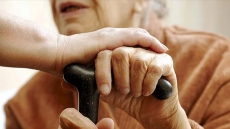VANCOUVER — A B.C. nurse practitioner who was being tested for Ebola will be reunited with her family on Friday after health care workers confirmed she does not have the virus.
Patrice Gordon of Rossland, B.C., travelled to Sierra Leone in November to provide medical care to people suffering from Ebola and returned to Canada on Christmas Day. She checked into hospital in Kelowna, B.C. on Monday after she felt cold symptoms.
She tested negative for Ebola on Tuesday, but remained in hospital for further testing until her release on Thursday. Gordon told reporters in a conference call that she never truly feared she had the disease.
"I knew there was a very, very outside chance, but it never felt that way to me. I didn't feel sick like I had seen people sick there. I knew how absolutely meticulous I had always been, we had always been," she said.
Gordon has a cold and coughed throughout the call with reporters. She said the entire experience has been exhausting and stressful, knowing that her family has been worried and the public is worried about there being a "patient zero" in Canada.
She admitted thinking at one point: "Oh my god, I really don't want to be patient zero."
Gordon has returned to a Kelowna hotel, where she has been staying since Christmas during the three week monitoring period that is standard for Red Cross workers returning from West Africa. She said her sons will some from Rossland to visit her on Friday.
She praised Kelowna General Hospital staff. Gordon was brought in through a back door, never went near any patient care areas and mostly spoke with doctors and nurses through glass, she said.
When Gordon first arrived at hospital, she felt intimidated by the amount of attention she received.
"It was frightening because all of a sudden I was under the microscope and there were so many people looking. I just felt like I was still just me but I had a cold," she said.
As someone with experience treating Ebola patients, Gordon found herself giving tips to the health care workers who handled her case. She said no one did anything dangerous, but she mostly offered advice on efficiency.
"It was more like, 'How about this idea?' Having been in an environment where you're doing something hundreds of times, and seeing someone do it for the first time, those kinds of suggestions," she said.
"Hopefully they never (have to do this) again. But if they did, hopefully they could be more efficient."
Gordon is one of 24 Canadian Red Cross workers who have travelled to West Africa to help with the Ebola crisis. Six of them remain, along with more than 10,000 local volunteers in countries affected by the disease.
She said she trained in a mock-up Ebola treatment centre in Madrid, Spain before arriving in Kenema, Sierra Leone. She wore full protective gear while treating patients, some of them children and babies.
"I've never done anything more rewarding in my life, you know, nothing," she said. "To reflect back on the day and to think that sense that you've made a difference — really, truly, made a difference."
Gordon stressed that people who have returned from West Africa are not dangerous unless they are showing symptoms. As soon as she felt a sore throat and a higher temperature, she knew she had to go to hospital as a precaution.
She said she is grateful for the support she has received but hopes the attention her case has attracted will die down, allowing the focus to return to the Ebola crisis. Despite what she's been through, she still hopes to go back to West Africa someday.
"The interest in me and my Ebola test, it's kind of embarrassing for me. It feels like I'm personally taking away from where the emphasis should be," she said.
"That's probably the most anxiety-provoking part of all this, is that I'm feeling a bit guilty for taking the spotlight away from where it belongs."





